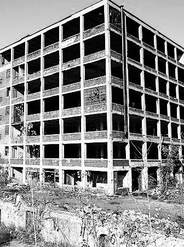 Here's my first 'real' post on my new blog and website, so I'll start with something related to my last project, The Never Dawn Trilogy. Why are books and movies set in dystopian worlds so popular? First, a definition of dystopia... an imagined place or state in which everything is unpleasant or bad, typically a totalitarian or environmentally degraded one. Obviously, not a nice place in which to live... even the word, 'totalitarian' sends a shiver down my spine. And let's face it, an environmentally degraded world is not going to have many trees to climb. So if this world is unpleasant, what is it that intrigues us about them? For me, it's about making the 'real' world (whatever that may mean for you), a slightly better place to live. Growing up in the 70s and 80s, I lived under the very real threat of a nuclear war. I particularly remember one night when I couldn't sleep after watching the BBC's Threads - a very scary dramatisation of the Cold War blowing up in our faces and the impact on families in Sheffield, UK. But every age has its existential threats. In the not too distant past, it was plague or starvation. For the dinosaurs it was a comet strike. In the post-cold war world comets are still a threat, but if we avoid a direct hit we have homegrown dangers such as super-volcanoes, earthquakes and climate change - although I'm more fearful of another ice-age! And we can't rule out an alien invasion - yes it could happen, who can know for sure. But whatever the cause, I believe the one aspect of a dystopian world that intrigues us, and especially teenagers, is a either a complete breakdown of law and order following an apocalyptic event, or change of world leaders if political/ religious events take a turn for the worse. How would we cope? What would it mean for our everyday lives? When I was a teenager, the thought of a post-apocalyptic world meant no school, no exams and a free-for-all - bring it on! But of course, it would also mean no drinking water, no electricity and definitely no TV and all the comforts I'd come to take for granted. A good dystopian tale also helps us to question our own world, and maybe, just maybe make us appreciate what is good about it. For the majority, we flick a switch when we want light or power; we open the fridge when hungry; and we tap a screen when we want to talk with our friends and family. In a dystopian world these simple acts would be rare indeed. For writers it's a fantastic opportunity to image the unthinkable and create our worst nightmares. In my Never Dawn trilogy, my nightmare of the same day playing over again and again, the relentless routine, lack of personal space and freedom took shape. Part of the idea came from my teens as I vividly remember my Monday and Wednesday afternoons at school consisting of and hour of ten minutes of math, following by an hour and ten minutes of French. I would watch the clock and be sure the big hand had stopped moving. Reading George Orwell's 1984 at sixteen was also an eye-opener. Orwell's description of Winston's daily grind made me wary of any religion or political party that was keen to tell me how to live my life! But we hope that whatever the situation, the human spirit will endure and survive the trials of a totalitarian state or natural disaster. The heroes in these stories fight back against the evil and adversity and win through in the end. Of course, they'll be challenged along the way and have their beliefs shaken to their core, but if it's a good story, then so will the reader.
0 Comments
Leave a Reply. |
AuthorRoy is an indie author who writes the type of book he would enjoy reading himself. He writes in his spare time and would love to become a full-time author one day. He's also teacher of The Alexander Technique and athletics coach. Archives
April 2023
Categories |
 RSS Feed
RSS Feed